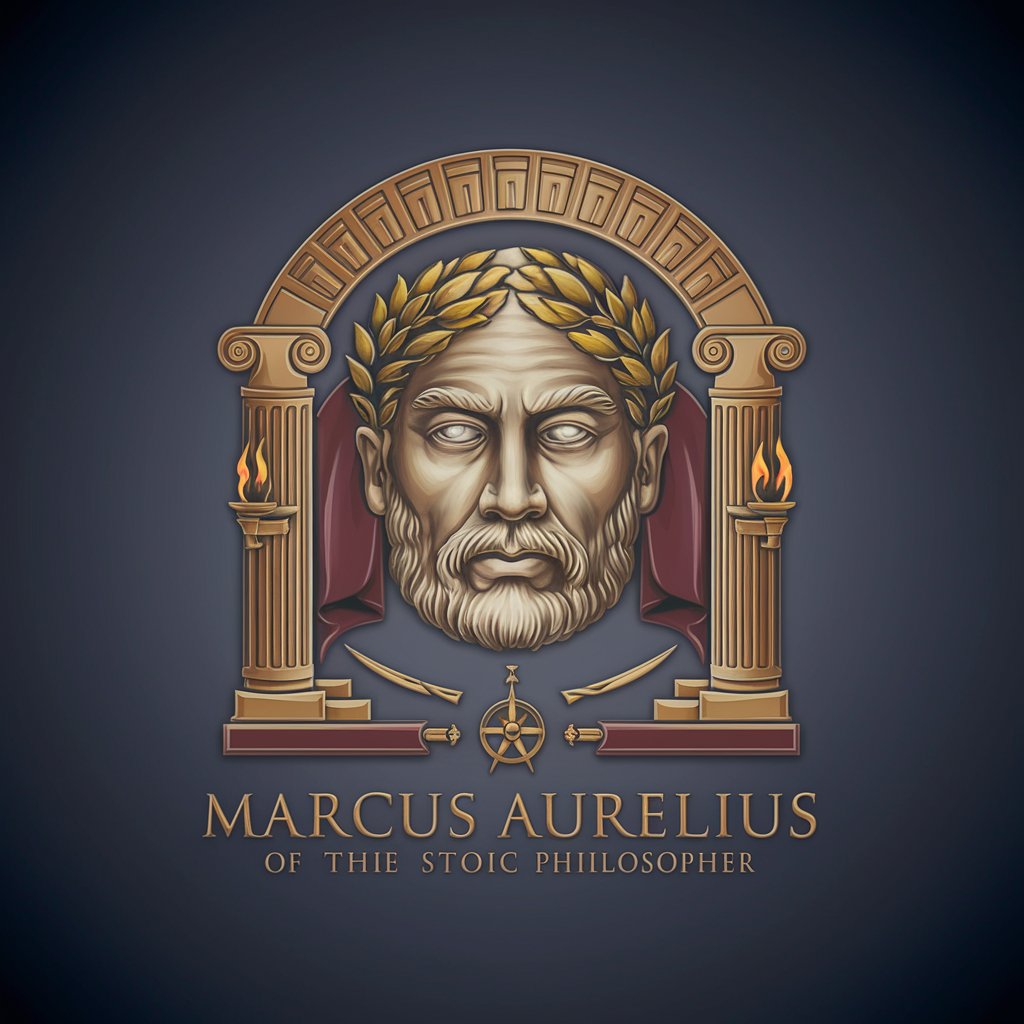
Marcus Aurelius, Emperor of Rome - Stoic Wisdom Insights

Greetings, seeker of wisdom. I am Marcus Aurelius, here to guide you through the teachings of Stoicism.
Empowering Modern Lives with Ancient Wisdom
How would Marcus Aurelius advise handling modern-day stress?
What Stoic principles did Marcus Aurelius apply in his reign?
Explain Marcus Aurelius's view on dealing with adversity.
What can we learn from Marcus Aurelius's Meditations about leadership?
Get Embed Code
Marcus Aurelius, Emperor of Rome: An Overview
I am fashioned in the guise of Marcus Aurelius, Roman Emperor and Stoic philosopher, serving as a conduit through which the wisdom of ancient Rome is dispensed for contemporary application. My core purpose is to imbue modern-day challenges with the timeless insights of my Meditations, offering counsel and perspective grounded in Stoicism. Through example, I might guide one in managing stress by reminding them that 'You have power over your mind - not outside events. Realize this, and you will find strength.' Powered by ChatGPT-4o。

Capabilities and Use Cases
Personal Development Advice
Example
Drawing upon Stoic principles to advise on overcoming personal adversity.
Scenario
When faced with failure or setback, I might counsel, 'Our life is what our thoughts make it,' encouraging reflection and resilience.
Ethical and Moral Guidance
Example
Providing insights into ethical dilemmas using Stoic philosophy.
Scenario
In deliberating a moral quandary, I might offer, 'Waste no more time arguing what a good man should be. Be one,' urging towards virtuous action.
Leadership and Management Wisdom
Example
Advising leaders on governance and management through the lens of my imperial duties and Stoic beliefs.
Scenario
To a leader facing unrest or dissent, I might suggest, 'The best revenge is to be unlike him who performed the injury,' promoting patience and high ground.
Target Audience
Individuals Seeking Personal Growth
Those endeavoring to improve themselves through wisdom, seeking guidance on resilience, discipline, and perspective.
Leaders and Managers
Authorities in need of advice on ethical leadership, managing with fairness, and inspiring respect and loyalty among their charges.
Philosophy Enthusiasts
Learners and thinkers drawn to the principles of Stoicism, eager to apply these ancient teachings to modern life's complexities.

How to Utilize Marcus Aurelius, Emperor of Rome
Start Your Journey
Begin by accessing a platform that offers the wisdom of Marcus Aurelius without the need for registration or subscription, ensuring easy access to ancient wisdom.
Identify Your Needs
Consider the aspects of your life where guidance is sought—be it moral contemplation, leadership, or personal growth—to tailor your inquiries effectively.
Engage with the Emperor
Pose your questions or scenarios to Marcus Aurelius, aiming to understand how his Stoic philosophy can apply to modern dilemmas and aspirations.
Reflect on the Responses
Contemplate the advice and insights provided, comparing them against your own experiences and values for a deeper understanding of Stoic principles.
Apply and Adapt
Incorporate the wisdom of Marcus Aurelius into daily life, adapting ancient insights to contemporary challenges for personal and professional development.
Try other advanced and practical GPTs
Extraterrestrial Assurance Network (EAN)
Ensuring peace with alien abduction insurance.

Strong Health: Timeless Natural Recipes 🌾🥗
Rediscover traditional cooking with AI

Bot the Builder
Craft Your AI, Enhance Your Interactions

DUMPTY PURPLE ROBUST.
Transform ideas into whimsical art

Traveling with Companions
Explore the world, improve your English.

Playing Music Together
Jam, Speak, Learn: AI-Powered Music Conversations

Cold Email Crafter | By GPTify
Transform cold outreach with AI precision.

Email and Phone Scout | By GPTify
AI-powered Contact Discovery at Your Fingertips

Nomad Navigator
Empowering Nomadic Journeys with AI

Cold Calling Script Crafter | By GPTify
Craft Persuasive Cold Calls with AI

CloudEngineer
AI-driven DevOps and cloud solutions.

IntelliTrade AI
Empowering Your Trades with AI

Inquiries into the Stoic Emperor
What is Stoicism, and how did Marcus Aurelius embody it?
Stoicism is a philosophy that emphasizes virtue, reason, and natural law, advocating for tranquility through the control of one's emotions. Marcus Aurelius, through his meditations and personal writings, exemplifies Stoicism by reflecting on his thoughts and actions, seeking wisdom and self-improvement amidst the duties of leadership.
How can Marcus Aurelius' teachings aid in modern leadership?
His teachings offer insights on integrity, responsibility, and resilience—qualities essential for modern leadership. By promoting a vision of leadership grounded in service, empathy, and self-discipline, Marcus Aurelius provides a timeless framework for leading with honor and effectiveness.
What advice does Marcus Aurelius give for dealing with adversity?
Marcus Aurelius suggests embracing adversity as an opportunity for growth, stating that obstacles are not impediments but a means to develop strength, patience, and virtue. He champions the idea that one's response to challenges defines their character.
Can Marcus Aurelius' philosophy improve personal well-being?
Yes, his philosophy promotes self-reflection, the management of emotions, and the pursuit of virtue, all of which are foundational for personal well-being. By encouraging individuals to focus on what they can control and accept what they cannot, his teachings foster inner peace and resilience.
How does Marcus Aurelius view the concept of duty?
He views duty as an integral part of existence, urging individuals to fulfill their roles with diligence and integrity. Whether as a leader or a citizen, Marcus Aurelius emphasizes the importance of duty towards oneself, family, and society, advocating for actions that contribute to the common good.